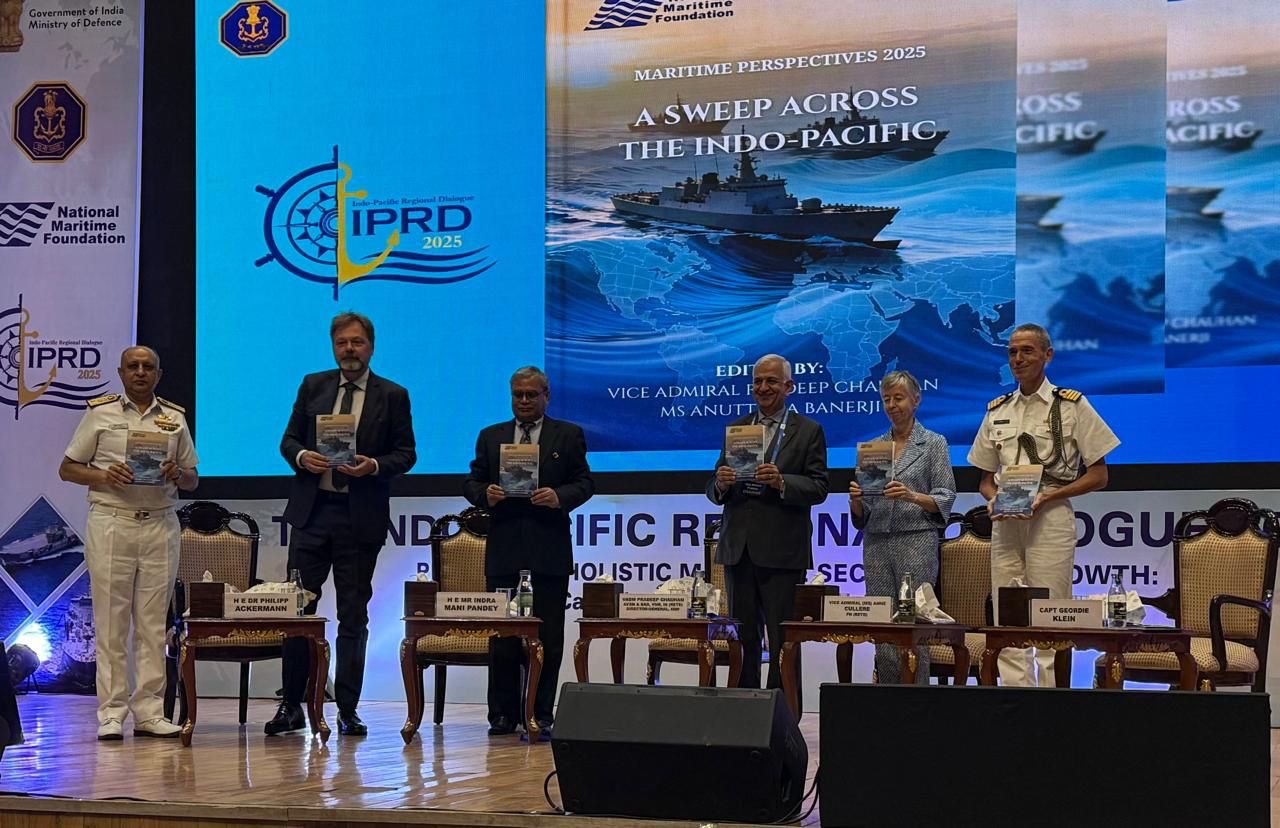Photo Credit: @AmbAckermann
At the seventh Indo-Pacific Regional Dialogue (IPRD) 2025, senior diplomats, naval leaders, and defence experts underscored the growing strategic alignment between India and Germany, particularly in maritime infrastructure, defence technology, and regional security cooperation across the Indo-Pacific.
The three-day conclave, hosted by the Indian Navy and the National Maritime Foundation (NMF) from October 28–30, 2025, convened over 20 nations at the Manekshaw Centre in New Delhi. The theme this year — “Promoting Holistic Maritime Security and Growth: Regional Capacity-Building and Capacity Enhancement” — reflected India’s role as a pivotal bridge between the Western and Eastern Indian Ocean.
Germany Ready to ‘Break New Ground’ with India
Addressing the gathering on October 29, Dr. Philipp Ackermann, Ambassador of Germany to India, reaffirmed Berlin’s commitment to strengthening Indo-German cooperation in maritime and defence domains.
“Germany and India are ready, more than ever, to break new ground — whether in developing modern defence systems, training, or logistics,” Ambassador Ackermann said, noting that both navies are “in the process of doing something very great, very soon.”
He lauded India’s rapid naval modernisation, describing it as “a remarkable build-up of capacities and capabilities.”
“India’s maritime infrastructure is growing at an impressive pace and getting better every year. That makes us good partners — because we can, together, use this infrastructure to pursue our common goals in the Indo-Pacific,” he added.
Ambassador Ackermann emphasised that Germany’s engagement in the region aims to “protect open societies, strengthen global supply chains, and uphold freedom of the seas and international law.”
Strengthening Maritime Presence and Joint Operations
Recalling Germany’s expanding naval footprint, Ambassador Ackermann noted that two German frigates visited India in 2024, participating in joint exercises and port calls. He also highlighted Germany’s participation in the multinational “Tarang Shakti” air exercise held in Coimbatore last year.
“Germany is ready to take on greater responsibility in promoting stability and security in the Indo-Pacific,” he said. “Even with the war in our neighbourhood keeping us busy, our commitment to this region will continue.”
Ambassador Ackermann confirmed Germany’s participation in the upcoming 2026 Milan naval exercise, to which 145 countries have been invited. He further recalled that a German frigate’s passage through the Taiwan Strait in 2024 was “a clear message in support of international law and freedom of navigation.”
Submarine Collaboration Under Project 75 (India)
The envoy’s remarks came amid renewed momentum in the Project 75 (India) or P75I submarine programme — a multi-billion-dollar initiative to build six next-generation submarines equipped with Air Independent Propulsion (AIP) systems.
Germany’s ThyssenKrupp Marine Systems (TKMS) has partnered with Mazagon Dock Shipbuilders Limited (MDL) to compete for the contract, seen as a flagship project in India’s naval modernisation. Both Berlin and Madrid are advocating a government-to-government framework similar to the 2016 Rafale deal, while Spain’s Navantia has teamed up with Larsen & Toubro (L&T).
In 2024, an Indian Navy delegation visited Germany to evaluate TKMS’s AIP technology, which allows submarines to remain submerged for extended durations. Meanwhile, the Defence Research and Development Organisation (DRDO) continues developing an indigenous AIP system, though it remains behind schedule.
BIMSTEC: Regional Cooperation as a Maritime Connector
Ambassador Indra Mani Pandey, Secretary-General of the Bay of Bengal Initiative for Multi-Sectoral Technical and Economic Cooperation (BIMSTEC), highlighted the organisation’s role in connecting South and Southeast Asia.
“Regional and sub-regional organisations like BIMSTEC are where Indo-Pacific cooperation truly takes shape,” Ambassador Pandey said. “Our recent MoU with the Indian Ocean Rim Association enables joint work in areas of convergence.”
Established in 1997, BIMSTEC now includes seven member states — India, Sri Lanka, Bangladesh, Myanmar, Thailand, Nepal, and Bhutan. Ambassador Pandey underlined that BIMSTEC remains central to India’s Neighbourhood First policy and a key vehicle for maritime collaboration in the Bay of Bengal, an area “critical to India’s defence, security, and development.”
Southern Africa’s Security Perspective
Adding a global dimension to the dialogue, Captain Mark Blaine (Retd) of the South African Navy detailed the challenges faced by the Southern African Development Community (SADC) littoral states.
“The SADC region faces spillover threats from the Red Sea, Horn of Africa, and Gulf of Guinea,” Captain Blaine said, citing instability in Mozambique, DR Congo, and Madagascar. He explained that maritime governance in the region is coordinated through the SADC Organ on Politics, Defence and Security, supported by standing maritime and defence committees.
Shared Values, Shared Future
Ambassador Ackermann concluded that India and Germany’s strategic partnership is built on “shared values, mutual trust, and the will to shape the future together.”
“The Indo-Pacific is not only a geopolitical region,” he said. “It is a reflection of our shared future — one rooted in stability, resilience, and a rules-based international order.”
Despite Europe’s preoccupations, he reiterated that Germany’s naval presence and partnerships in the Indo-Pacific will continue to expand, affirming Berlin’s long-term commitment to regional peace and prosperity.



